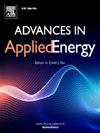Variational quantum circuit learning-enabled robust optimization for AI data center energy control and decarbonization
Abstract
As the demand for artificial intelligence (AI) models and applications continues to grow, data centers that handle AI workloads are experiencing a rise in energy consumption and associated carbon footprint. This work proposes a variational quantum computing-based robust optimization (VQC-RO) framework for control and energy management in large-scale data centers to address the computational challenges and overcome limitations of conventional model-based and model-free strategies. The VQC-RO framework integrates variational quantum circuits (VQCs) with classical optimization to enable efficient and uncertainty-aware control of energy systems in AI data centers. Quantum algorithms executed on noisy intermediate-scale quantum (NISQ) devices are used for value function estimation trained with Q-learning, leading to the formulation of a robust optimization problem with uncertain coefficients. The quantum computing-based robust control strategy is designed to address uncertainties associated with weather conditions and renewable energy generation while optimizing energy consumption in AI data centers. This work also outlines the computational experiments conducted at various AI data center locations in the United States to analyze the reduction in power consumption and carbon emission levels associated with the proposed quantum computing-based robust control framework. This work contributes a novel approach to energy-efficient and sustainable data center operation, promising to reduce carbon emissions and energy consumption in large-scale data centers handling AI workloads by 9.8 % and 12.5 %, respectively.

 求助内容:
求助内容: 应助结果提醒方式:
应助结果提醒方式:


